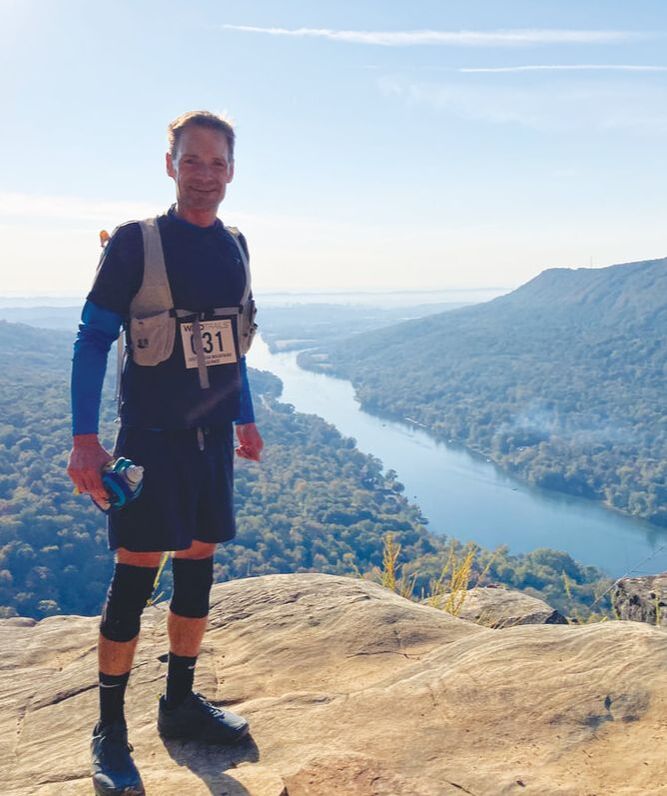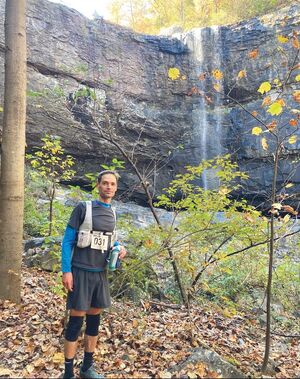Once a year for the past 13 years, trail runners have geared up for a unique challenge: the Chattanooga Mountains Stage Race. Run over three days, the courses total 60 miles of steep elevations, rocky paths, and limitless natural beauty.
This year, the race was postponed to October from its usual June date due to extreme heat. October turned out to be a glorious time for the race, thanks to 60-70 degree highs and peak fall foliage. The race courses took runners from Mowbray to Signal mountains, down to Suck Creek, and on the Georgia side of Lookout Mountain.
Randy Whorton and his wife, Kris, are the founders of Wild Trails, the nonprofit that puts on the Stage Race each year. Randy, who serves as the executive director of Wild Trails, explains that the organization does much more for the Chattanooga area than manage races. “All of the money we make from trail races goes back to the trail and waterway community. We build and maintain trails in the area and maintain a team of chainsaw experts to clear fallen trees,” he said.
Though Wild Trails holds races throughout the year, the Stage Race is distinctive thanks to its format. This has attracted runners from contiguous states like Mississippi, but also runners from much farther away. Eric Podlasek is one of these runners. A 46-year-old schoolteacher and father of three young children, Podlasek travelled 11 hours from Illinois for the race.
Podlasek had driven through Chattanooga many times before on the way to visit Florida and developed a desire to explore the mountains on foot. “I looked for a race on ultrasignup.com in the area, and this stage race came up,” he said. “I had never done a stage race before, so the idea of running one through beautiful mountains for multiple days sounded very intriguing.”
Randy Whorton said that about half of those who start the stage race finish it, in part due to the strict time cutoffs each day. “There are not many runners who can run 60 miles in a week, let alone in three days,” said Randy.
Eric Podlasek was one of the proud finishers this year. His advice to other runners considering training for this race in 2023 is twofold: “Bring your camera or phone to remember the experience because the views and trails are amazing,” and plan out your recovery strategy. His nightly routine involved ice baths, ibuprofen, and a massage gun.
Podlasek, not accustomed to running in the area, was surprised by how “technical” the terrain here is. “It hadn’t occurred to me that ropes, staircases and a ladder would be needed to make my way through the trails, and I have never run over so many swinging bridges,” he said. “There were parts that were not runnable for me, but it added to the overall adventure of the event.”
“If my mind started to drift, I would trip or fall,” Podalsek continued. “[The terrain] forces you to stay completely in the moment and block out all other thoughts or distractions from your normal day-to-day life. You are forced to just enjoy and appreciate where you are.”
Forced moments of Zen aside, Podlasek would recommend the race simply for the mountain views and the great food Wild Trails provided at the end of each day (freshly grilled burgers, pizzas, chicken tacos, and craft beer). He found Chattanoogans to be very hospitable and looks forward to vacationing here with his family in the future.
The Stage Race, as all Wild Trails races, ran on “volunteer power,” utilizing about 20 volunteers this year. If you are interested in running or volunteering for a Wild Trails race, or just learning more about the nonprofit’s environmental work, visit www.wildtrails.org.
by Ginger Gibson
This year, the race was postponed to October from its usual June date due to extreme heat. October turned out to be a glorious time for the race, thanks to 60-70 degree highs and peak fall foliage. The race courses took runners from Mowbray to Signal mountains, down to Suck Creek, and on the Georgia side of Lookout Mountain.
Randy Whorton and his wife, Kris, are the founders of Wild Trails, the nonprofit that puts on the Stage Race each year. Randy, who serves as the executive director of Wild Trails, explains that the organization does much more for the Chattanooga area than manage races. “All of the money we make from trail races goes back to the trail and waterway community. We build and maintain trails in the area and maintain a team of chainsaw experts to clear fallen trees,” he said.
Though Wild Trails holds races throughout the year, the Stage Race is distinctive thanks to its format. This has attracted runners from contiguous states like Mississippi, but also runners from much farther away. Eric Podlasek is one of these runners. A 46-year-old schoolteacher and father of three young children, Podlasek travelled 11 hours from Illinois for the race.
Podlasek had driven through Chattanooga many times before on the way to visit Florida and developed a desire to explore the mountains on foot. “I looked for a race on ultrasignup.com in the area, and this stage race came up,” he said. “I had never done a stage race before, so the idea of running one through beautiful mountains for multiple days sounded very intriguing.”
Randy Whorton said that about half of those who start the stage race finish it, in part due to the strict time cutoffs each day. “There are not many runners who can run 60 miles in a week, let alone in three days,” said Randy.
Eric Podlasek was one of the proud finishers this year. His advice to other runners considering training for this race in 2023 is twofold: “Bring your camera or phone to remember the experience because the views and trails are amazing,” and plan out your recovery strategy. His nightly routine involved ice baths, ibuprofen, and a massage gun.
Podlasek, not accustomed to running in the area, was surprised by how “technical” the terrain here is. “It hadn’t occurred to me that ropes, staircases and a ladder would be needed to make my way through the trails, and I have never run over so many swinging bridges,” he said. “There were parts that were not runnable for me, but it added to the overall adventure of the event.”
“If my mind started to drift, I would trip or fall,” Podalsek continued. “[The terrain] forces you to stay completely in the moment and block out all other thoughts or distractions from your normal day-to-day life. You are forced to just enjoy and appreciate where you are.”
Forced moments of Zen aside, Podlasek would recommend the race simply for the mountain views and the great food Wild Trails provided at the end of each day (freshly grilled burgers, pizzas, chicken tacos, and craft beer). He found Chattanoogans to be very hospitable and looks forward to vacationing here with his family in the future.
The Stage Race, as all Wild Trails races, ran on “volunteer power,” utilizing about 20 volunteers this year. If you are interested in running or volunteering for a Wild Trails race, or just learning more about the nonprofit’s environmental work, visit www.wildtrails.org.
by Ginger Gibson



 RSS Feed
RSS Feed